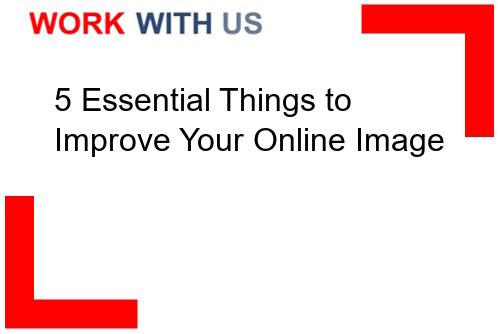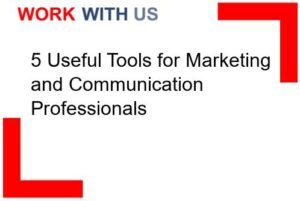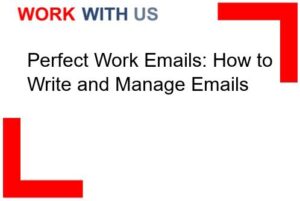In today’s digital age, having a strong online image is crucial for personal and professional success. Whether you are a job seeker, a business owner, or simply an individual looking to make a positive impression, your online presence can greatly impact how others perceive you. To help you enhance your online image, here are five essential things to consider.
First and foremost, maintaining a professional and up-to-date social media presence is vital. Potential employers, clients, and even acquaintances often turn to social media platforms to gather information about individuals. Therefore, it is crucial to ensure that your social media profiles reflect your desired image. Start by reviewing your privacy settings and adjusting them accordingly. Next, carefully curate your content, ensuring that it aligns with your personal or professional goals. Share relevant articles, showcase your achievements, and engage in meaningful conversations. By presenting yourself professionally on social media, you can leave a lasting positive impression on others.
Secondly, having a well-designed and user-friendly website or online portfolio is essential for showcasing your skills and expertise. Whether you are a freelancer, an artist, or a professional in any field, having a dedicated online space to display your work can greatly enhance your online image. Invest time in creating a visually appealing website that accurately represents your brand or personal identity. Ensure that your website is easy to navigate and provides clear information about your background, experience, and achievements. Regularly update your portfolio with your latest work to demonstrate growth and expertise.
Thirdly, actively engaging with your online community is crucial for building a positive online image. Participate in relevant online forums, comment on industry-related articles, and join professional groups on social media platforms. By sharing your knowledge and insights, you can establish yourself as an expert in your field and gain credibility. Additionally, engaging with others allows you to build valuable connections and expand your network, which can lead to new opportunities.
Fourthly, managing your online reputation is essential for maintaining a positive image. Regularly search for your name on search engines and social media platforms to see what information is available about you. If you come across any negative or inaccurate content, take immediate action to address it. Respond professionally and constructively to any criticism or negative feedback you receive. By actively managing your online reputation, you can ensure that others perceive you in the best possible light.
Lastly, it is crucial to be mindful of your online behavior and the content you share. Remember that everything you post online can be seen by others, and it can have a lasting impact on your image. Avoid sharing controversial or offensive content, and think twice before posting anything that could be misinterpreted or taken out of context. By being mindful of your online behavior, you can maintain a positive and professional image.
In conclusion, enhancing your online image is essential in today’s digital world. By maintaining a professional social media presence, creating a well-designed website, actively engaging with your online community, managing your online reputation, and being mindful of your online behavior, you can significantly improve your online image. Remember, your online presence is a reflection of who you are, so invest time and effort into cultivating a positive and authentic image that accurately represents you.
Building a strong personal brand: key strategies to enhance your online image
In today’s digital age, establishing a strong personal brand has become increasingly important. With the rise of social media and online platforms, individuals have the opportunity to shape their online image and create a lasting impression. Whether you are a professional looking to advance your career or an entrepreneur aiming to attract clients, building a strong personal brand can significantly impact your success. This comprehensive guide will explore key strategies to enhance your online image and establish a powerful personal brand.
First and foremost, it is crucial to define your personal brand. Take the time to reflect on your values, strengths, and unique qualities that set you apart from others. Understanding your personal brand will help you create a consistent and authentic online presence. Consider what you want to be known for and how you want others to perceive you. This self-reflection will serve as the foundation for building your personal brand.
Once you have defined your personal brand, it is essential to establish a strong online presence. Start by creating a professional website or blog that showcases your expertise and accomplishments. This platform will serve as a central hub for your personal brand, allowing others to learn more about you and your work. Ensure that your website is visually appealing, easy to navigate, and provides valuable content to your audience.
In addition to a website, leverage social media platforms to enhance your online image. Choose platforms that align with your personal brand and target audience. Whether it’s LinkedIn for professional networking or Instagram for visual storytelling, each platform offers unique opportunities to showcase your expertise and engage with your audience. Consistently post high-quality content that reflects your personal brand and provides value to your followers.
Engagement is key when building a personal brand. Actively participate in online communities and engage with your audience. Respond to comments, answer questions, and provide insights. By actively engaging with your audience, you not only build relationships but also establish yourself as an authority in your field. Additionally, seek out collaborations and partnerships with other individuals or brands that align with your personal brand. Collaborations can help expand your reach and introduce you to new audiences.
Another crucial aspect of building a strong personal brand is maintaining a consistent and professional online image. Ensure that your online presence is cohesive across all platforms. Use a consistent color scheme, font, and tone of voice to create a recognizable brand identity. Additionally, be mindful of the content you share and the language you use. Avoid controversial topics or offensive language that may damage your online image. Remember, everything you post online contributes to your personal brand.
To enhance your online image, it is essential to continuously learn and grow. Stay updated with industry trends and advancements in your field. Share your knowledge through blog posts, articles, or videos. By positioning yourself as a thought leader, you establish credibility and attract a loyal following. Additionally, invest in personal development by attending conferences, workshops, or online courses. Continuously improving your skills and knowledge will further strengthen your personal brand.
Lastly, building a strong personal brand requires patience and consistency. Rome wasn’t built in a day, and neither will your personal brand. Consistently show up, provide value, and engage with your audience. Building a personal brand is a long-term investment that requires dedication and perseverance. Stay true to your personal brand and adapt to changes in the digital landscape.
In conclusion, building a strong personal brand is essential in today’s digital world. By defining your personal brand, establishing a strong online presence, engaging with your audience, maintaining a consistent image, continuously learning, and being patient and consistent, you can enhance your online image and create a powerful personal brand. Remember, your personal brand is your reputation, and it is up to you to shape it in a way that aligns with your goals and values.
Leveraging social media: maximizing your online presence for a positive image
Leveraging social media is crucial in today’s digital age, as it allows individuals and businesses to maximize their online presence and cultivate a positive image. With billions of people actively using social media platforms, it has become an essential tool for communication, networking, and brand building. By strategically utilizing social media, one can effectively engage with their target audience, establish credibility, and enhance their reputation. However, it is important to approach social media with caution and adhere to certain guidelines to ensure a positive online image.
Building a Strong Online Presence
To maximize their online presence, individuals and businesses must first establish a strong foundation on social media platforms. This involves creating professional profiles that accurately represent their brand or personal identity. It is essential to use high-quality images, compelling descriptions, and consistent branding across all social media accounts. By doing so, they can create a cohesive and recognizable online presence that resonates with their target audience.
Engaging with the Target Audience
Engagement is key to leveraging social media effectively. By actively interacting with their target audience, individuals and businesses can build meaningful connections and foster a loyal following. This can be achieved by regularly posting relevant and engaging content, responding to comments and messages promptly, and participating in discussions within their industry. By actively engaging with their audience, they can establish themselves as thought leaders and gain the trust and respect of their followers.
Creating Valuable Content
Content is the backbone of any successful social media strategy. To maximize their online presence, individuals and businesses must create valuable and shareable content that resonates with their target audience. This can include informative blog posts, captivating videos, eye-catching infographics, or thought-provoking podcasts. By consistently delivering high-quality content, they can position themselves as experts in their field and attract a larger audience.
Monitoring Online Reputation
Maintaining a positive online image requires constant monitoring of one’s online reputation. Individuals and businesses must regularly search for mentions of their brand or name on social media platforms and address any negative feedback or comments promptly and professionally. By promptly addressing and resolving issues, they can demonstrate their commitment to customer satisfaction and showcase their dedication to maintaining a positive online image.
Utilizing Social Media Analytics
To maximize their online presence, individuals and businesses must leverage social media analytics to gain insights into their audience’s behavior and preferences. By analyzing data such as engagement rates, reach, and demographics, they can tailor their content and strategies to better resonate with their target audience. This data-driven approach allows them to make informed decisions and optimize their social media presence for maximum impact.
The Power of Influencer Marketing
Influencer marketing has emerged as a powerful tool for leveraging social media. By collaborating with influencers who have a large and engaged following, individuals and businesses can tap into their influence and reach a wider audience. Influencers can help promote products, services, or causes, and their endorsement can significantly impact brand visibility and credibility. However, it is crucial to choose influencers whose values align with the brand and ensure that the partnership is authentic and genuine.
Navigating Social Media Challenges
While social media offers numerous opportunities, it also presents challenges that individuals and businesses must navigate. One such challenge is managing negative feedback or online trolls. It is important to handle such situations with grace and professionalism, addressing concerns and resolving issues in a timely manner. Additionally, individuals and businesses must be mindful of privacy and security concerns, ensuring that personal information is protected and adhering to platform guidelines and regulations.
Staying Ahead of Trends
To maximize their online presence, individuals and businesses must stay ahead of social media trends. The digital landscape is constantly evolving, and it is crucial to adapt and embrace new platforms, features, and strategies. By staying informed and being proactive, they can leverage emerging trends to their advantage and maintain a competitive edge in the online space.
In conclusion, leveraging social media is essential for maximizing online presence and cultivating a positive image. By building a strong online presence, engaging with the target audience, creating valuable content, monitoring online reputation, utilizing social media analytics, and embracing influencer marketing, individuals and businesses can effectively leverage social media to enhance their reputation and achieve their goals. However, it is important to navigate social media challenges, stay ahead of trends, and approach social media with caution to ensure a positive online image.
Crafting an engaging online portfolio: showcasing your skills and expertise
In today’s digital age, having a captivating online portfolio has become essential for professionals across various industries. Whether you are a graphic designer, writer, photographer, or any other creative individual, an online portfolio serves as a powerful tool to exhibit your skills and expertise to potential clients or employers. By curating a visually appealing and well-organized portfolio, you can effectively demonstrate your capabilities and leave a lasting impression on your audience.
To begin crafting an engaging online portfolio, it is crucial to carefully select the content that best represents your skills and expertise. Start by showcasing your most impressive and relevant work. This could include completed projects, case studies, or even personal creative endeavors that highlight your unique style and abilities. Remember to choose a variety of pieces that demonstrate your versatility and range, as this will help potential clients or employers understand the breadth of your capabilities.
In addition to showcasing your work, it is equally important to provide context and background information for each project. By including a brief description or summary, you can give your audience a deeper understanding of the project’s objectives, challenges, and your role in its execution. This not only adds credibility to your work but also allows potential clients or employers to assess your problem-solving skills and expertise in specific areas.
When it comes to the design and layout of your online portfolio, simplicity and ease of navigation are key. Opt for a clean and minimalist design that allows your work to take center stage. Avoid cluttering your portfolio with excessive text or distracting elements that may divert attention from your work. Instead, focus on creating a visually cohesive and aesthetically pleasing presentation that reflects your personal brand and style.
To further engage your audience, consider incorporating multimedia elements into your portfolio. This could include videos, animations, or interactive elements that provide a more immersive experience. By utilizing these dynamic features, you can effectively showcase your skills and expertise in a way that captivates and holds the attention of your audience.
In addition to visual appeal, it is essential to ensure that your online portfolio is easily accessible and responsive across different devices and platforms. With the increasing use of mobile devices, it is crucial to optimize your portfolio for mobile viewing. This means ensuring that your website is responsive, loads quickly, and maintains its visual integrity on smaller screens. By doing so, you can reach a wider audience and make a lasting impression on potential clients or employers, regardless of the device they use to access your portfolio.
Furthermore, don’t forget to include a dedicated “About Me” section in your online portfolio. This section provides an opportunity to introduce yourself, share your professional journey, and highlight your key skills and expertise. Use this space to convey your passion for your craft, your unique approach to projects, and any notable achievements or accolades you have received. By personalizing your portfolio and sharing your story, you can establish a connection with your audience and leave a lasting impression.
Lastly, regularly updating your online portfolio is crucial to ensure its relevance and effectiveness. As you complete new projects or acquire new skills, make sure to add them to your portfolio to keep it fresh and up to date. Additionally, regularly reviewing and refining your portfolio’s content and design will help you maintain a high standard of quality and ensure that it continues to effectively showcase your skills and expertise.
In conclusion, crafting an engaging online portfolio is a vital step in showcasing your skills and expertise to potential clients or employers. By thoughtfully curating your work, providing context, and utilizing a visually appealing design, you can captivate your audience and leave a lasting impression. Remember to optimize your portfolio for mobile viewing, incorporate multimedia elements, and regularly update its content to ensure its relevance. With a well-crafted online portfolio, you can effectively demonstrate your capabilities and stand out in today’s competitive digital landscape.
Managing online reputation: proactive steps to protect and enhance your image
Managing online reputation is crucial in today’s digital age, where information spreads rapidly and can have a lasting impact on individuals and businesses alike. With the rise of social media and online platforms, it has become increasingly important to take proactive steps to protect and enhance one’s image. This comprehensive text will delve into various aspects of managing online reputation, providing valuable insights and strategies to navigate this complex landscape.
Understanding the Importance of Online Reputation Management
In the digital era, an individual’s or organization’s reputation is no longer confined to word-of-mouth or traditional media. Online platforms have given everyone a voice, making it easier for opinions and information to be shared and accessed by a global audience. Consequently, managing online reputation has become a critical aspect of personal and professional success.
Monitoring and Responding to Online Feedback
One of the first steps in managing online reputation is monitoring what is being said about oneself or one’s brand. This can be done by setting up Google Alerts or using specialized online reputation management tools. By staying informed about online mentions, individuals and businesses can promptly address any negative feedback or misinformation.
Responding to online feedback is equally important. Engaging with customers or followers in a timely and respectful manner can help mitigate potential damage to one’s reputation. Acknowledging concerns, offering solutions, and demonstrating a commitment to customer satisfaction can go a long way in building a positive online image.
Building a Strong Online Presence
A proactive approach to managing online reputation involves building a strong online presence. This can be achieved through various means, such as creating and regularly updating a professional website, maintaining active social media profiles, and publishing high-quality content that showcases expertise and credibility.
By consistently sharing valuable information and engaging with the online community, individuals and businesses can establish themselves as trusted authorities in their respective fields. This not only enhances their online reputation but also helps to counteract any negative content that may arise.
Leveraging the Power of Search Engine Optimization (SEO)
Search Engine Optimization (SEO) plays a crucial role in managing online reputation. By optimizing online content with relevant keywords and ensuring that it ranks high in search engine results, individuals and businesses can control the narrative surrounding their brand.
Investing in SEO strategies, such as creating keyword-rich content, building quality backlinks, and optimizing website structure, can help push positive content to the top of search engine results. This makes it more likely for individuals and businesses to be perceived positively by online users, while pushing down any negative or irrelevant content.
Proactively Addressing Negative Content
Despite best efforts, negative content may still surface online. In such cases, it is important to address the issue proactively rather than ignoring or avoiding it. Ignoring negative content can lead to further damage to one’s reputation, as it may be perceived as a lack of accountability or concern.
When faced with negative content, individuals and businesses should consider reaching out to the source of the content to address any concerns or inaccuracies. If necessary, legal action can be pursued to remove defamatory or false information. Additionally, creating and promoting positive content can help overshadow any negative content and rebuild a positive online image.
Managing online reputation requires a proactive and strategic approach. By monitoring online mentions, responding to feedback, building a strong online presence, leveraging SEO, and addressing negative content, individuals and businesses can protect and enhance their image in the digital realm. In an era where online reputation can make or break personal and professional success, investing time and effort into managing one’s online presence is essential.



